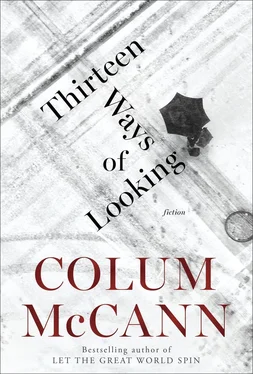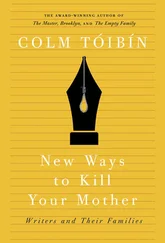A quiet getaway, she was told. A retreat for a month or two. Fresh sea air. A time for repose. But she had felt the doom of it all: seventy-six years old, arriving with a single suitcase to a place of final worship.
She taps a cigarette, rolls the flint on the lighter, inhales deeply. The smoke is dizzying. Already the tin coffee can is a quarter full of ash and butts. Her fellow Sisters have grown to tolerate her weakness, even grudgingly admire it, the tall, thin Irish nun with her maverick routine of aloneness.
She watches the cold and the smoke together shape the air. Behind her, the lights in the house flicker off, one by one, the other Sisters off to their prayers.
The trees stand stark against the sky. It is fall, or autumn: sometimes she loses track of which word belongs where. Small matter, it is that time of year when the dark descends early.
She smokes her second cigarette and scrunches it out in the grass at her feet, leans down, searches among the cold blades for the filter, drops it in the hanging coffee can.
That was him. It was most certainly him.
A gust of wind shuts the screen door sharply behind her. She reaches out her arms like someone recently blind. The darkness more visible as her eyes adjust.
In the living room she pauses at the large digital television. A row of lights shine from the contraptions underneath: a cable box, a DVD player. She slips her hand along the edge of the television but can find no buttons. She fumbles in the dark for the remote, bumps against the side of the coffee table. A musty smell rises from the carpet. A dropped spoon. A fallen newspaper.
Only then does she think to strike her lighter.
In the bright flare she spies the head of the remote slipped down between the sofa cushions. A row of menu items, HDM1, HDM2, PC. One needs to be a nuclear engineer these days just to bring a machine to life. She clicks through. Vampires. Baseball. Cop shows. She is tempted, for a moment, to remain with the Mormon wives.
There are three Spanish-language channels all in close proximity to one another. Surely, at some stage during the night, there will be a repeat. She pulls a cushion tight against her stomach. The digital clock flickers. There is, she knows, a way to record the show, even to freeze the screen — one of the Sisters did it last week during a CBS special on the Shroud — but she might lose the image altogether.
When the report finally comes on, she slides off the couch, onto the floor, sits close to the television. London. A series of peace talks. Representatives from all sides gathering together. An array of microphones set up on a table. A line of five men, two women.
The hairs along her arm bristle: Please, Lord, let it not be him.
The words tangle and braid. Guerilla, peace accord, land rights, low-level talks, reconciliation, treaty.
Then it is him. For three short seconds. She reaches her hand toward his face, recoils. His heavy-lidded eyes. His pixelated mouth. He is close-shaven, sharp, his hair neatly cut. He is a little heavier, more compact. He does not speak, but there is no mistake. He has taken on the aura of a diplomat.
She sits back against the couch, fumbles for her cigarettes. Make Yourself present, Lord. Come to my aid.
When he slapped her face, he would call her puta . In the jungle cage he pulled back her hair, yanked it so hard that her neck felt as if it would snap. A whisper. In her ear. As if he himself couldn’t afford to hear the words. Pendeja. In the safe house where she was taken for four weeks, in the white room where she watched the caterpillars crawl along the cracks in the walls, he would read to her aloud from the newspaper before he yanked open her blouse and bit her breast until it bled.
—
SHE IS WOKEN IN the early morning by Sister Anne who sits quietly at the side of the bed. The curtains have been slightly parted.
She pulls back the bed covers, swings her legs out, fumbles for her slippers. She can tell by the angle of light that she has missed morning prayer.
— I overslept. I’m so sorry.
— There’s something we must talk about, Beverly.
— Of course.
Sister Anne is a woman who has aged gracefully apart from a shallow set of accordion lines that seem to hurry toward her cheekbones, giving her a vaguely scattershot look.
— By the television, she says. Last night.
It takes Beverly a moment for the evening to return, as if from one of those ancient sets she knew as a child in Galway, a quick flare of light and then a slow bromiding outward. The recollection of his face. The chill that ripped along her body. The manner in which he was constructed, square upon digital square, all the new edges to him.
— I think I must have woken from, I might, I may have been dreaming.
— Well, it’s unfortunate, but I’m afraid I’m going to have to ask you to stop.
— Of course.
She is unsure of what it is that she must stop. The house is meant as a retreat. None of the Sisters have been told of her background, only that she lived in South America once, that she has come from Houston, that she is suffering exhaustion, she is here to rediscover sleep, that is all.
What she needs now is to get beyond the first bruised moments of waking. To make her bed, to take a shower, to say her dailies.
Sister Anne rises from the chair and only then does Beverly notice that she has brought her a cup of coffee and a biscuit on a saucer. The small mercies.
— Thank you.
Sister Anne turns at the door, haloed in fluorescence from the hallway, and says gently: There will be no need to pay for it, of course.
— Pay for it?
— There are, Beverly, two cigarette burns in the carpet.
—
AT THE HOME IN HOUSTON the girls had been surprised to find a nun they could smoke with. They thought her so tall. Sister Stretch. The home was set up next to a clinic. Theirs was an open-door policy. The girls came and went. The corridors hummed. Mornings in the kitchen, afternoons in the counseling room, evenings out combing streets of half-lamplight: Hermann Park, Montrose, Sunnyside, Hiram Clarke, the Fifth Ward. Whole nights spent awake in the convent house. The protests outside. The shouting. The placards. The bullhorns. She and her Sisters were condemned from the pulpit. Radicals, dissenters. They never thought themselves anything of the sort. It was simply a home, a place for the girls to stay. She counseled them. Children with children. She made no political stance. Abortion, pro-life, anti-woman. The words did not concern her. The language seemed designed to only merchandise flesh. She wanted to be mute in everything but action. To give a shoulder. To take an elbow. To feel her feet strike the ground. She worked late into the night. She listened in church to the priest railing against her, his voice high and indignant. She bowed her head. She accepted the invective. She still took the sacrament. On principle, she never escorted the girls to the clinic, but she watched them go and collected them afterward, took their arms, walked them through the gauntlet. Sometimes the same girls returned, just months later, bearing children once more. Exhaustion got her. Three times she collapsed in the community room. They found her eventually in the chapel, slumped over, a trickle of blood from her nose. She was shocked when, in the downtown hospital, a nurse showed her a mirror: the darkness beneath her eyes looked tattooed in. The emergency-room doctors had mistaken her, at first, as homeless. They ripped off her clothes. She struggled to pull the sheet back across. What perplexed them were the scars on her breasts, how she hid them, the hard jagged lines, their peculiar tracery.
—
THE WIND RIPPLES THE dune grass. She wears a long blue skirt, a dark cardigan, an orange windbreaker. Lay clothes, always. She has not, for forty years, worn any formal clothing, just the simple wooden cross beneath her blouse.
Читать дальше












